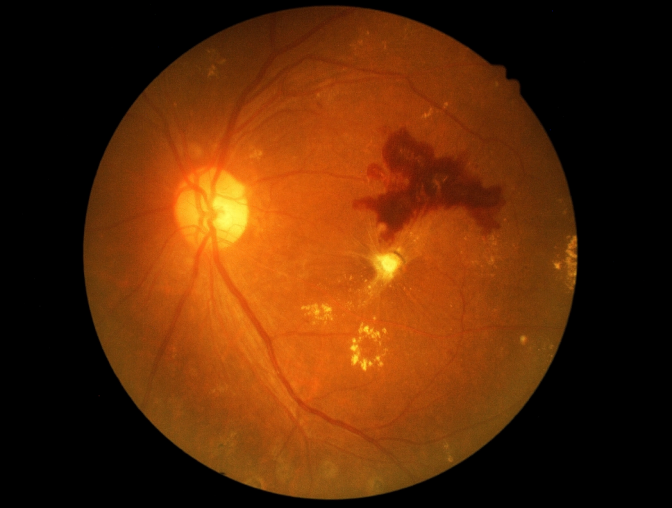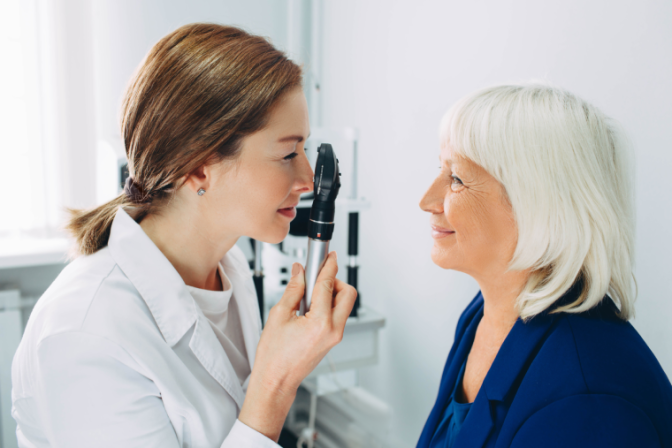50% OFF a Complete Pair of Glasses
*Restrictions apply. Click here for details.
Diabetic Retinopathy Screening & Treatments at Clarkson Eyecare
People with diabetes may develop diabetic retinopathy, an eye condition that damages the retina. The longer you have diabetes, the greater the risk factors become for experiencing this complication. Your retina must work properly for optimal vision. The retina is the light-sensitive structure on the inner back wall of the eye. When light enters through your eye, an image of what is in your field of vision appears on the retina. The retina transmits these light signals through the optic nerve to the brain, which then translates the images into visuals your brain can understand.
A network of tiny blood vessels keeps the retina nurtured and working well. When someone with diabetes has high blood pressure or uncontrolled blood sugar levels, it may damage small blood vessels throughout the body, including within the eye. The retina may not receive enough blood flow to function properly, leading to vision loss. Additionally, blood vessels in your retina may leak small amounts of blood into the inner eye, blocking your vision. In some cases, abnormal blood vessels may form within the eye, which can form scar tissue, contributing to loss of vision.
What Are Symptoms of Diabetic Retinopathy?

At first, people who develop diabetic retinopathy may not notice any vision changes because the symptoms are silent in the condition's early stages. When diabetic retinopathy becomes more advanced, it may affect vision in a number of ways:
Your vision may appear blurry
You may notice floaters in your field of vision
Your night vision may worsen, or you may begin to see colors less vividly
You may see dark spots or unexpected blank areas within your field of vision
If you have diabetes and notice any of these vision problems, call your eye doctor for an appointment to assess your eye health.
How Do Eye Doctors Diagnose Diabetic Retinopathy?

An eye doctor can assess your retinal health during a comprehensive eye exam. During the appointment, the doctor will dilate your pupils with eye drops to better examine the inner structures of your eyes. Your eye doctor may perform a test known as optical coherence tomography, which takes images of the retina to assess its thickness to check for the presence of diabetic retinopathy.
Another test that an eye doctor may perform during a comprehensive eye exam is called a fluorescein angiography. This procedure helps the eye doctor view the blood vessels in your retina. Dye is injected into your arm and travels through blood vessels, reaching your eyes. The dye appears bright yellow, which makes it easy for the doctor to view the tiny blood vessels. Using a specialized camera, the doctor takes images of your eyes to see if the blood vessel activity suggests diabetic retinopathy.
How Do Doctors Treat Diabetic Retinopathy?

In the early stages of diabetic retinopathy, managing your diabetes may be enough to keep the eye condition under control. It is important to see your eye doctor regularly for a dilated eye exam to keep track of any changes to your eye health.
When diabetic retinopathy affects your ability to see, certain treatments may help to preserve your remaining vision. Some people receive medication known as anti-VEGF therapy, which stops damaged blood vessels from leaking within the eye. The medication is injected into the eye after the eye is numbed. Laser treatments may seal leaky blood vessels or minimize the presence of new, abnormal blood vessels in your retina. If scar tissue or blood builds up within the eye, surgery may be required to remove it.
How Can People with Diabetes Prevent Developing Diabetic Retinopathy?

After you've been diagnosed with diabetes, take any medications that your doctor prescribes to help keep your blood pressure and blood sugar levels in a healthy range. See an eye doctor at least once a year for a dilated eye exam to keep tabs on your eye health and catch signs of diabetic retinopathy and other eye conditions early.
Good nutrition and regular physical activity may help to keep your blood sugar levels in a healthy range. Eat a healthy diet and get regular exercise to lower your risk factors for developing diabetic retinopathy or to prevent existing retinopathy from becoming worse. Diabetic retinopathy may lead to vision loss or blindness, but these complications are usually preventable with self-care and an eye doctor's intervention.
Schedule an Appointment with EyeCare Associates
If you have diabetes, it’s important to schedule a complete eye exam to ensure any diabetic eye conditions are under control. Visit the Alabama diabetic eye specialists at EyeCare Associates! Give us a call or book an appointment online at your nearest EyeCare Associates Alabama eye care center.
